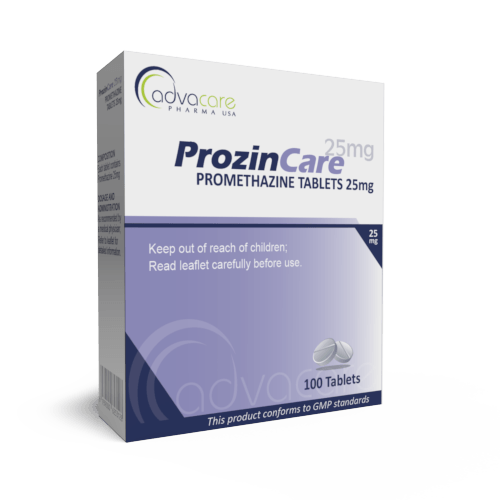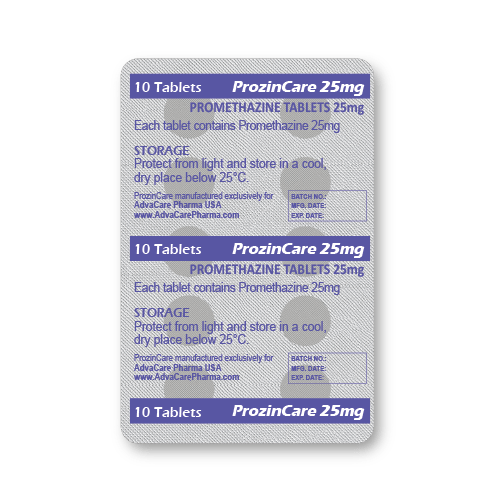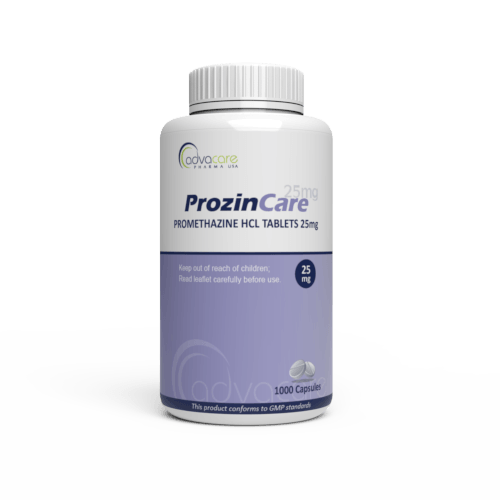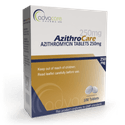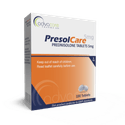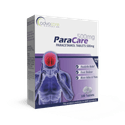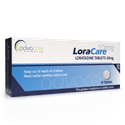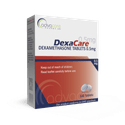- Home›
- Pharmaceuticals›
- Pharmaceutical Tablets›
- Promethazine Tablets
Promethazine Tablets
Dosage
Packaging
What is Promethazine?
Active Ingredients: Promethazine HCl
Promethazine HCl Tablets are a drug used to treat symptoms caused by allergic rhinitis and allergic conjunctivitis. This medication is also indicated for use as an antiemetic agent in the active and prophylactic treatment of motion sickness. When combined with other medications, promethazine may be used to treat anaphylaxis.
Promethazine HCl is also used for sedation or the control of nausea or vomiting associated with certain types of anesthesia or surgery.
Promethazine HCl is classified in the family of medicines known as phenothiazines. It is an H1-antagonist with anticholinergic, sedative, and antiemetic effects and some local anesthetic properties.
This drug is well absorbed after oral administration and clinical effects are apparent within 20 minutes after administration. The effect generally lasts 4 to 6 hours. This effect may also last for up to 12 hours. Promethazine is metabolized by the liver to various compounds, including promethazine sulfoxide, and minorly to desmethyl promethazine and a hydroxy metabolite. This medication is excreted through the urine.
This product is also available in the form of syrup.
AdvaCare Pharma is a producer and exporter of Promethazine HCl Tablets. This medicine is produced in our GMP-certified facilities in China, India, and the USA. These facilities are routinely audited to ensure they comply with health, safety, and environmental standards.
Why are we a top Promethazine manufacturer?
AdvaCare Pharma is a manufacturer of Promethazine Tablets and other cost-effective and sustainable pharmaceuticals for an ever-changing global market. Promethazine Tablets are a GMP-compliant medicine that is available for distribution.
As a leading Promethazine manufacturer, we work with international partners including pharmaceutical distributors, hospitals, pharmacies and other medical and government organizations. We have established a vested supplier-distributor relationship, ensuring a mutually advantageous outcome during market entry and development.
Uses
What is Promethazine Hydrochloride used for?
It is used to:
- relieve allergy symptoms, like rash, itching, and runny nose.
- treat and prevent symptoms associated with motion sickness.
- control nausea and vomiting during anesthesia or chemotherapy.
It may be used as a sedative or anti-anxiety agent before or after surgery or during labor.
Promethazine HCl can be combined with other medications to treat anaphylaxis or as an adjuvant with opiate painkillers, but it is not a first-line treatment for these conditions. Healthcare professionals should decide if this drug is suitable based on the patient's current health condition.
How are Promethazine Tablets used?
This medication is intended to be taken orally. This medication can be taken with or without food.
What dose should be taken?
Adult Dosing Dosage may vary based on different medical indications:
- For allergies, the usual dose for adults is 25mg at bedtime, as needed. For allergies, 12.5mg can be taken before meals and on retiring if necessary.
- For preventing motion sickness, the usual dose for adults is 25mg, taken twice a day. The tablet should be taken 30 minutes to 1 hour before traveling. It can be repeated after 8-12 hours if necessary. For children older than 2 years old, the usual dose is 12.5-25mg, taken 30 minutes to 1 hour before traveling.
- For nausea and vomiting, the usual dose is 25mg. A second dose may be taken 4-6 hours later, if necessary.
- For presurgical anxiety or pain, the usual dose is 50mg the evening before surgery and 25-50mg after surgery.
- For sedation, the usual dose is 25mg to 50mg for nighttime, presurgical, or obstetrical sedation.
Pediatric Dosing For sedation, the usual dose is 12.5mg to 25mg by oral route.
For preoperative medication, the recommended doses are 0.5mg per pound of body weight in combination with an appropriately reduced dose of narcotic or barbiturate and the appropriate dose of an atropine-like drug.
Other Dosing There is no data available about the dosing of geriatric patients. There is also no data available about dosing in patients with liver or renal impairments. Consult with a doctor to get personalized advice based on your current health condition.
The exact dosage is based on medical condition, response to treatment, age, and weight. Refer to a doctor or pharmacist for guidelines on dosage. Do not exceed the advisable dosage.
Who can use Promethazine?
Promethazine is used to relieve allergy symptoms, like rash, itching, and runny nose. It can be also used for treating and preventing symptoms associated with motion sickness. Promethazine HCl can control nausea and vomiting during anesthesia or chemotherapy.
Pregnancy Promethazine HCl in pregnant women within 2 weeks of delivery may inhibit platelet aggregation in the newborn. Pregnant women or those who plan to get pregnant should inform their doctors about any products they are using at the moment including Promethazine HCl. There is not enough data available about the safety and efficacy of this product in pregnant women.
Nursing It is unknown if this medication passes into breast milk. It might have unwanted effects on nursing infants. Women who are breastfeeding should consult with a doctor before taking this product.
Labor and Delivery Promethazine HCl may be used alone or as an adjunct to narcotic analgesics during labor. It does not lead to significant side effects for the newborn. Consultation with a professional should be made prior giving this drug to women in labor or delivery.
Pediatric This medication should not be used in pediatric patients who are less than 2 years of age. It can cause respiratory distress (fatal respiratory depression) when used in pediatric patients according to FDA.
Geriatric There are no serious indications for not using this product on older patients. Elderly people have similar outcomes as adults when treated with this drug. The dose should be identified based on the patient’s current health condition and the work of the liver, kidneys, and heart. Older patients are more prone to sosme side effects and this medication should be used with caution in this population. Patients should also inform their doctors if they are taking other drugs.
Other warnings
Promethazine HCl should be used with caution in patients with impaired liver, kidney, or cardiac function.
Promethazine may lead to impairment of physical and mental abilities when driving a vehicle or operating machinery.
Laboratory or drug test interactions may be affected in patients who receive therapy of Promethazine HCl. This includes pregnancy tests and glucose tolerance tests. It is because this drug can influence the glucose levels or certain hormones.
Side Effects
As with all pharmaceuticals, some unwanted effects can occur from the use of Promethazine Tablets.
Common side effects include, but may not be limited to:
- dizziness
- drowsiness
- confusion
- constipation
- blurred or double vision
- dry mouth
Call a doctor if more serious side effects occur, such as:
- fainting
- slow heartbeat
- mood changes such as hallucinations, irritability, confusion
- unusual or uncontrolled movements
- tremors
- difficulty with urination
- easy bruising or bleeding
- signs of an infection such as fever or sore throat
- severe abdominal pain
- persistent nausea or vomiting
- jaundice
Seek immediate medical attention if the following develop:
- slow or shallow breathing
- seizures
- symptoms of neuroleptic malignant syndrome (high fever, muscle stiffness, changes in mental state, irregular heartbeat)
For a comprehensive understanding of all potential side effects, consult a medical professional.
If any symptoms persist or worsen, or you notice any other symptoms, please call your doctor immediately.
Precautions
Do NOT use Promethazine Tablets if:
- You are allergic to promethazine or other phenothiazines.
- You are hypersensitive to sulfites.
- You have liver disease.
- You have a history of seizures.
- You have chronic obstructive pulmonary disease.
- You have sleep apnea or other breathing disorder.
- You have glaucoma.
- You have problems with urination.
- You have an adrenal gland tumor.
- You have low levels of calcium in the blood.
Drug interactions may increase the risk of serious side effects or change how your medications work. Consult with your doctor about any vitamins, supplements, or medications you are taking before treatment with promethazine HCl.
Driving or operating machinery should be avoided, as the medication may cause sedation.
Alcohol should be avoided, as it may worsen the adverse effects caused by promethazine HCl.
Promethazine HCl may increase sensitivity to the sun. Wear extra protection while outside and avoid long exposure to the sun.
Patients who are pregnant or planning to get pregnant should inform their doctors before taking this drug.
This medication should not be used in pediatric patients less than two years of age because it might lead to respiratory depression.
Promethazine HCl should not be used for patients in comatose states or patients who had an idiosyncratic reaction to promethazine.
This product should be kept out of reach of children.
References
Oral premedication for the prevention of hypersensitivity reactions to paclitaxel
This is a prospective study that evaluates the availability and safety of the administration of promethazine and dexamethasone per os in the premedication of paclitaxel hypersensitivity reactions.
It includes 180 eligible cancer patients: 100 patients received paclitaxel weekly while 80 patients received paclitaxel every 3 weeks. All these patients received premedication with promethazine 25mg per os, dexamethasone 2-20mg per os, and cimetidine 300mg intravenously. Out of the 100 patients, hypersensitivity reactions occurred only in one patient (1%). Out of the 80 patients hypersensitivity reactions occurred in 3 patients (4%), while there were no adverse hypersensitivity reactions in 96% of patients.
The conclusion of this study is that premedication with promethazine and dexamethasone reduces hypersensitivity reactions in patients and shortens the time of treatment for patients and treating staff.

You might be interested in...
Why AdvaCare Pharma?
As an industry leader, we are aware of our responsibility to provide affordable and sustainable solutions to improve healthcare worldwide.
